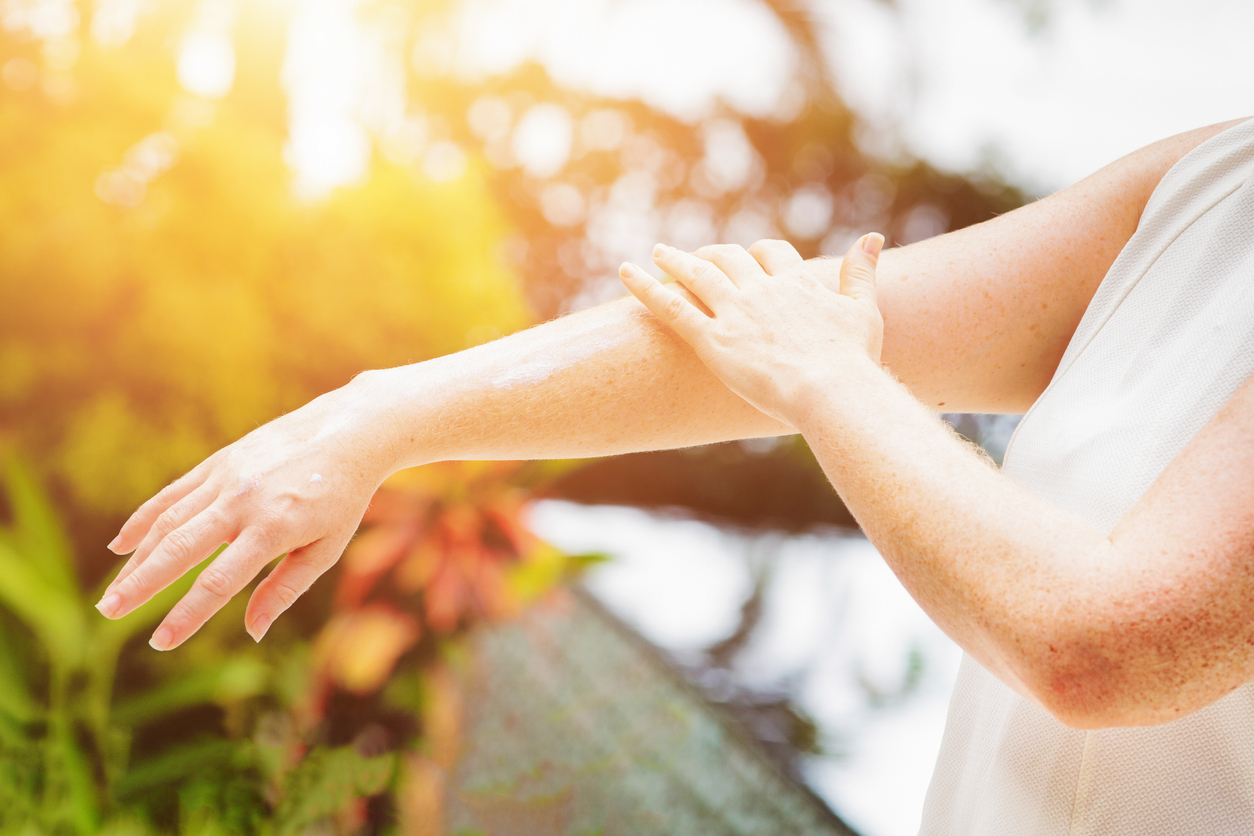Commitment + Clinical Leadership = Better Outcomes

10 Sunburn Relief Tips
Summer brings hot, long days, and many of us will spend them outdoors. It’s important to wear sunscreen and protective clothing during this season to protect your skin from the sun’s UVA and UVB rays.
However, sometimes sunscreen can wear off due to sweat, or you might forget to reapply sunscreen after time spent in the water. Inadequate sun protection can lead to accidental sunburns that cause pain and irritation.
When you have a sunburn, it’s important to treat it as soon as possible. Severe cases of sunburn can lead to sun poisoning or peeling skin. Sunburns also put you more at risk for wrinkled skin, dark spots, and skin cancer.1
Sunburn Relief Tips
Here are 10 sunburn relief tips for you and your loved ones if you are exposed to too much sun.
- Take cool baths or showers. Cool water can help soothe burned and irritated skin. After the shower or bath, gently pat your skin without rubbing it.
- Use lotion or aloe. Aloe gel can help soothe sunburned skin. You should put it in the fridge for a few hours to make sure it’s cool when applying it to the skin. A moisturizing lotion can lock in moisture on the skin and keep it from getting dry. Calamine lotion has been found to be soothing on burned skin.
- Apply a medicated cream. For more severe sunburns, apply a nonprescription hydrocortisone cream to the sunburned areas for a few days. This cream can help soothe the burns and alleviate any itching.2
- Pay attention to the ingredients in products. Avoid any lotions or products with ingredients that will irritate your skin. Alcohol in products will dry out the skin, making it harder to heal a sunburn. Petroleum jelly has been found to trap heat on your skin, which can prevent your sunburn from cooling down. Topical treatments such as benzocaine and lidocaine can cause allergic reactions and worsen your symptoms.3
- Take medicine. If you or a loved feels uncomfortable and needs medicine, ibuprofen or aspirin can help with the pain, inflammation, and redness.
- Stay hydrated. Drinking enough water is beneficial every day, especially when you’re sunburnt. Sunburns draw fluid to the skin’s surface and away from the rest of the body. This makes it even more important to stay hydrated.4
- Allow blisters to heal. If you see blisters appear after a burn, then it’s a second-degree sunburn. Blisters help the skin heal, so it’s necessary to avoid touching or popping them. Allowing blisters to heal will help protect you from infection and scarring on the skin. If they do pop, gently clean the area. You can apply an antibiotic ointment to the blister and cover it with a bandage.
- Treat your eyes. If you have sunburn around your eyes, it’s important to practice proper eye care to avoid vision problems. If you wear contacts, many optometrists recommend to avoid wearing them while the sunburn heals. Don’t rub your eyes because that can irritate the sunburn, and try resting with a cool towel over them to soothe the pain and inflammation.
- Take extra care of your skin. When your skin is sunburned, you should practice good skincare that will prevent further damage to the skin. Take a break from being in the sun, and wear sunscreen and loose clothing to cover your skin when outdoors.
- Seek medical attention. If you have severe sunburn symptoms such as dehydration, infection on the sunburned area, vomiting, or a fever over 103 degrees, seek medical attention immediately.2
Preventing Sunburn
You can take steps to help prevent sunburns this summer and in the future.
- Wear sunscreen. Sunscreen is essential when it comes to protecting your skin and preventing aging skin and skin cancer. There are many different kinds of sunscreens to choose from, and experts recommend you wear at least 30 SPF.5
- Limit your time in the sun. Limiting your time in the sun can help prevent sunburns. If you’re staying outside for longer than 30 minutes, make sure you apply sunscreen on any exposed skin. If you want to stay outdoors but limit your sun exposure, try sitting in the shade. Also, be mindful of overcast days when you’re outdoors. 80% of UV rays can still penetrate the clouds and cause sunburns.6
- Avoid the midday sun. If you like being outdoors but want to limit your sunburn risk, try to avoid being outside midday. The sun is at its strongest between 10am and 4pm, meaning you’re more likely to face the risk of sunburn during that time.7
Protect Yourself in the Sun
When you and your loved ones are spending time in the sun this summer, make sure to protect your skin! Sunscreen, loose protective clothing, and limiting sun exposure can help you avoid sunburns. If you or a loved one gets sunburned, try these tips to soothe the pain and speed up the healing process.
Saber Healthcare is an organization dedicated to providing consultant services to long-term care providers. This article is for informational purposes and is not meant to be seen as professional advice. Please consult with a medical expert before relying on the information provided.
Sources
- https://www.saberhealth.com/news/blog/how-sun-exposure-affects-the-skin-and-body.
- https://www.mayoclinic.org/first-aid/first-aid-sunburn/basics/art-20056643.
- https://health.clevelandclinic.org/sunburn-relief/.
- https://www.aad.org/public/everyday-care/injured-skin/burns/treat-sunburn.
- https://www.aad.org/media/stats-sunscreen#:~:text=Dermatologists%20recommend%20using%20a%20sunscreen,of%20the%20sun's%20UVB%20rays.
- https://www.skincancer.org/risk-factors/sunburn/.
- https://www.epa.gov/radtown/ultraviolet-uv-radiation-and-sun-exposure#:~:text=Limit%20time%20in%20the%20midday,and%20especially%20at%20higher%20altitudes.
